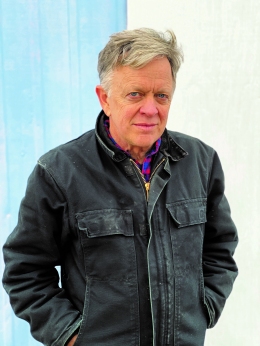
“One of our great narrative journalists . . . Conover’s approach isn’t so much about pinning people down as letting them reveal themselves. He’s such a wry and nimble writer that much of the time this works, yielding rounded portraits that are full of ambiguity, anguish and contradiction.” – The New York Times
Conover’s career in immersive journalism has taken him from a nuanced exploration of local culture for his 1991 title Whiteout: Lost in Aspen to a year-long stint as a prison guard resulting in Newjack: Guarding Sing Sing, which won the National Book Critics Circle Award for nonfiction and was a finalist for the Pulitzer Prize. For his latest critically-acclaimed book released last fall, Cheap Land Colorado: Off-Gridders at America’s Edge, Conover returned to his home state, living off and on for four years in the San Luis Valley in an effort to better understand the divisions that have increasingly riven the American social and political consciousness. His writing has appeared in The New York Times Magazine, The Atlantic, The New Yorker, Harper’s Magazine, and National Geographic. He is a professor at, and the former director of, New York University’s Arthur L. Carter Journalism Institute.
Read the interview with Ted Conover in the 2023 Ski Edition of Steamboat Magazine.
Ted Conover, in his own words:
"My first book (Rolling Nowhere), began as research for a senior anthropology thesis. A transcendent moment occurred in a freight yard in Bakersfield, California, where, as I spoke with a guy my age named Enrique Jarra, it dawned on me that Mexican migrants were the true, modern-day incarnation of the classic American hobo. Coyotes, my second book, recounts a year of work and travel with these migrants.
A smart guy I met in New York introduced me at a party as a writer who “made a living sleeping on the ground,” which got me worried and led me to Aspen and Whiteout, a very different sort of first-person ethnography. Then I moved to New York and wrote Newjack: Guarding Sing Sing, an account of immersion in a world that is tough and dangerous and–if a person’s not careful–soul-shrinking. That research was my hardest ever, but also paid an enduring dividend.
In The Routes of Man, I link a series of challenging first-person passages down roads with reflections on how this most extensive man-made artifact changes us all, both intentionally and not. It’s a book about roads but I’m in it as well. Immersion: A Writer’s Guide to Going Deep is an attempt to share what I’ve learned about this sort of writing. My most recent book, Cheap Land Colorado: Off-Gridders at America’s Edge, recounts a passage into a landscape and community that in truth I haven’t left yet. It may be the closest I’ve come in any of my books to “going native.”
I admire writing where writers have something at stake; where they don’t just depend on experts but rather take time to think and research and participate, thereby transforming themselves into experts; where caring and the urgency of the subject transform the writing into something that matters."
